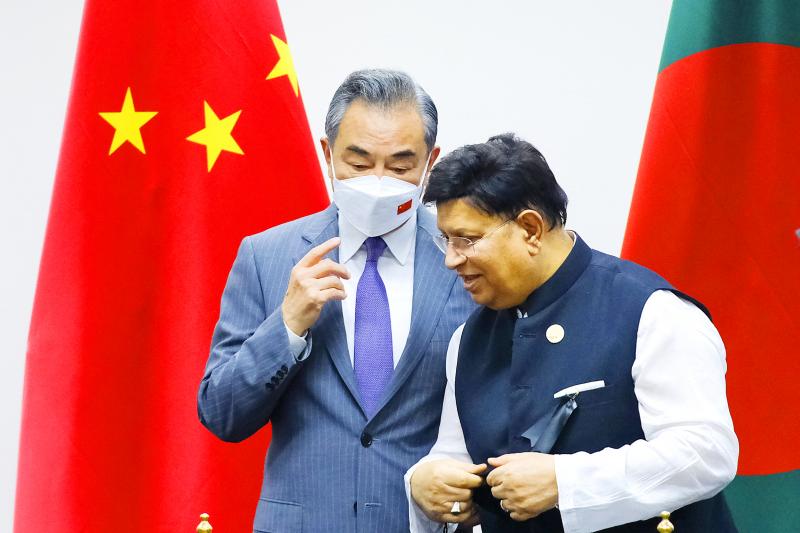Bangladesh on Sunday sought cooperation from China to repatriate Rohingya refugees to Myanmar during a visit by Chinese Minister of Foreign Affairs Wang Yi (王毅), who promised better trade ties, investment and support for infrastructure development in the South Asian nation.
China had used its influence in Myanmar to broker a November 2017 agreement to repatriate about 700,000 Rohingya Muslim refugees who fled persecution in Myanmar in August that year. Despite attempts to send them back, the refugees refused, fearing danger in Myanmar, which was exacerbated by the military takeover last year.
Wang arrived in Dhaka on Saturday and met with Bangladeshi Prime Minister Sheikh Hasina and Minister of Foreign Affairs A.K. Abdul Momen. They discussed bilateral and global issues before Wang’s departure on Sunday, Bangladeshi State Minister of Foreign Affairs Shahriar Alam said.

Photo: AP
Bangladesh has strong relations with China, which is a major trade partner mostly for raw materials, but maintaining close ties with Beijing is challenging for the South Asian nation, which also balances diplomatic and trade relationship with India and the US, China’s main rivals.
More than 500 Chinese companies are active in Bangladesh. China is involved in the country’s major infrastructure projects such as seaports, a river tunnel and highways, and helped build its largest bridge over the River Padma at a cost of US$3.6 billion.
Amid recent tensions between China and Taiwan, Bangladesh issued a statement reiterating its support for Beijing’s “one China” policy. After winning elections in 2008, Hasina’s administration closed the Taiwanese business representative office in Dhaka in response to a request from China, and since then China has increased its engagement in Bangladesh.
Bangladesh’s garment industry, which brings in more than 80 percent of foreign currency from exports, is heavily dependent on China for raw materials.
On Sunday, Wang told Hasina during a courtesy call that his country considers Bangladesh as a “strategic development partner” and would continue to support it, Hasina’s spokesman Ihsanul Karim said.
The United News of Bangladesh agency reported that Wang also promised to stand beside Bangladesh “on all issues at international forums.”
The state-run Bangladesh Sangbad Sangstha news agency reported that Hasina raised the global tensions caused by the Russian invasion of Ukraine and Western sanctions against Moscow, saying that “people [across the world] are enduring difficult times. South Asia, Southeast Asia and China can work together for economic progress.”
Alam said that Wang agreed to expand trade benefits by raising duty-free access to 98 percent from the current 97 percent of Bangladeshi products and services to Chinese markets.
“It’s a good news for Bangladesh as we have a thriving economy based on exports,” Alam said. “Now they have offered another 1 percent from Sept. 1,” he said, adding that the new tax advantage is likely to include garments, woven and other products that had previously faced some barriers.
He said Bangladesh would get a list from China soon about the products and services that would have duty-free access.
Alam said that Wang explained to the Bangladeshi foreign minister that “some countries misunderstand and misinterpret” China. He did not elaborate.
Momen told reporters separately that the Chinese minister mentioned that a section of Taiwanese was being provoked against the sovereignty of China.

MONEY GRAB: People were rushing to collect bills scattered on the ground after the plane transporting money crashed, which an official said hindered rescue efforts A cargo plane carrying money on Friday crashed near Bolivia’s capital, damaging about a dozen vehicles on highway, scattering bills on the ground and leaving at least 15 people dead and others injured, an official said. Bolivian Minister of Defense Marcelo Salinas said the Hercules C-130 plane was transporting newly printed Bolivian currency when it “landed and veered off the runway” at an airport in El Alto, a city adjacent to La Paz, before ending up in a nearby field. Firefighters managed to put out the flames that engulfed the aircraft. Fire chief Pavel Tovar said at least 15 people died, but

LIKE FATHER, LIKE DAUGHTER: By showing Ju-ae’s ability to handle a weapon, the photos ‘suggest she is indeed receiving training as a successor,’ an academic said North Korea on Saturday released a rare image of leader Kim Jong-un’s teenage daughter firing a rifle at a shooting range, adding to speculation that she is being groomed as his successor. Kim’s daughter, Ju-ae, has long been seen as the next in line to rule the secretive, nuclear-armed state, and took part in a string of recent high-profile outings, including last week’s military parade marking the closing stages of North Korea’s key party congress. Pyongyang’s official Korean Central News Agency (KCNA) released a photo of Ju-ae shooting a rifle at an outdoor shooting range, peering through a rifle scope

South Korea would soon no longer be one of the few countries where Google Maps does not work properly, after its security-conscious government reversed a two-decade stance to approve the export of high-precision map data to overseas servers. The approval was made “on the condition that strict security requirements are met,” the South Korean Ministry of Land, Infrastructure and Transport said. Those conditions include blurring military and other sensitive security-related facilities, as well as restricting longitude and latitude coordinates for South Korean territory on products such as Google Maps and Google Earth, it said. The decision is expected to hurt Naver and Kakao

India and Canada yesterday reached a string of agreements, including on critical mineral cooperation and a “landmark” uranium supply deal for nuclear power, the countries’ leaders said in New Delhi. The pacts, which also covered technology and promoting the use of renewable energy, were announced after Indian Prime Minister Narendra Modi and Canadian Prime Minister Mark Carney hailed a fresh start in the relationship between their nations. “Our ties have seen a new energy, mutual trust and positivity,” Modi said. Carney’s visit is a key step forward in ties that effectively collapsed in 2023 after Ottawa accused New Delhi